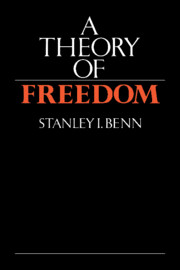Book contents
- Frontmatter
- Contents
- Foreword
- Preface
- Acknowledgments
- 1 Persons and values
- 2 Practical rationality and commitment
- 3 Reasons in conflict: Quandaries and consistency
- 4 Values and objectivity
- 5 Natural personality and moral personality
- 6 The principle of respect for persons
- 7 Freedom of action
- 8 Freedom as autarchy
- 9 Autonomy and positive freedom
- 10 Autonomy, integration, and self-development
- 11 Self-realization, instinctual freedom, and autonomy
- 12 Autonomy, association, and community
- 13 Human rights and moral responsibility
- 14 The principle of privacy
- 15 Interests in privacy
- 16 Conclusion: A semantic theory of freedom
- Notes
- Index
3 - Reasons in conflict: Quandaries and consistency
Published online by Cambridge University Press: 04 December 2009
- Frontmatter
- Contents
- Foreword
- Preface
- Acknowledgments
- 1 Persons and values
- 2 Practical rationality and commitment
- 3 Reasons in conflict: Quandaries and consistency
- 4 Values and objectivity
- 5 Natural personality and moral personality
- 6 The principle of respect for persons
- 7 Freedom of action
- 8 Freedom as autarchy
- 9 Autonomy and positive freedom
- 10 Autonomy, integration, and self-development
- 11 Self-realization, instinctual freedom, and autonomy
- 12 Autonomy, association, and community
- 13 Human rights and moral responsibility
- 14 The principle of privacy
- 15 Interests in privacy
- 16 Conclusion: A semantic theory of freedom
- Notes
- Index
Summary
Preference theory and cognitivism
In this chapter I shall pick up the question, referred to briefly in Chapter 1, whether there are formal conditions for deciding and acting rationally in situations in which an agent's beliefs commit him to actions which are mutually excluding. Can someone act rationally if the courses he perceives as available in a given situation are ranked differently according to whether he considers them in the light of one evaluative belief rather than another?
The difference between principles, values, and such other kinds of evaluative beliefs as there may be, which was a leading topic in Chapter 1, need not concern us much in this chapter. Unless one postulated a lexical ordering of commitments, for example, that the action commitment deriving from any person-oriented evaluative belief necessarily overrode any deriving from, say, an outcomeoriented belief, similar problems would arise whether conflict occurred between two principles, two values, or a principle and a value. If, for example, in the manner of Robert Nozick, rights commitments were thought to be absolute side-constraints on other kinds of action commitment, then the particular form of the commitment would indeed be significant for the way in which conflicts between it and other commitments could be rationally resolved. Even so, since conflicts might still arise between different rights commitments, a theory of practical rationality would still need to offer guidance on the resolution of such conflicts. I do not share Nozick's view that rights always have priority.
- Type
- Chapter
- Information
- A Theory of Freedom , pp. 43 - 64Publisher: Cambridge University PressPrint publication year: 1988



